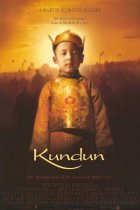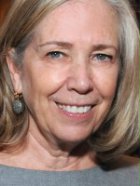
Kundun Page #2
- PG-13
- Year:
- 1997
- 134 min
- 1,175 Views
Lhamo slides over so that the man can sit on the platform
beside him. The man picks up a few pebbles and drops them -
he knows the game.
We recognize this servant. His name is KEUSTANG RINPOCHE.
He is one of the monks we saw at the Oracle lake, the one
with the mesmerizing eyes. Keustang Rinpoche is the Lama of
Sera Monastery.
Lhamo sees a dark brown rosary around the Servant's neck and
immediately pulls at the string of beads.
LHAMO:
Mine.
The Servant takes the rosary off and gives it to the boy.
Lhamo hangs the string of beads around his own neck. The
Servant makes a move to take back the rosary, but Lhamo
resists.
LHAMO:
Mine.
SERVANT:
Mine.
LHAMO:
Please.
SERVANT:
I will give it to, if you can
tell me who I am.
Lhamo looks up, into the man's piercing, black eyes.
LHAMO:
The Lama of Sera.
You come.
The Mother enters and immediately sees the rosary around her
son's neck. She gives it back to the Servant.
MOTHER:
Lhamo, no.
Lhamo goes back to his game. The Mother hands the tired man
a slice of bread and a steaming cup of tea. The man's
hands are shaking. He cannot look the woman in the eye.
SERVANT:
Thank you.
EXT. COURTYARD DAWN
The travelers make their departure at dawn.
As the party reaches the gate, Lhamo runs from the house,
crying:
LHAMO:
Wait! No!
The men stop. Lhamo runs to the Servant.
LHAMO:
Me, too. Me go, too.
Lhasa!
Lhamo is in tears.
MOTHER:
No, no, no. Lhasa!
He always says he will travel
far away. He always wants to go.
SERVANT:
We cannot, young master.
LHAMO:
You come back?
A pause.
SERVANT:
We will.
The travelers head down the road.
Mother and child return to their home, the Mother carrying
the boy on her hip as he swings himself around to take a
last look at the strangers.
EXT. COURTYARD DAWN
The Father readies a pack train of horses. Lobsang and
Lhamo pull on the cinche straps.
EXT. FARMLAND DAY
The Mother plows with a heavy yoke attached to a large yak.
Lobsang Samten and Tsering Dolma help their mother. Lhamo
sleeps under an umbrella.
EXT. COURTYARD DAY
Lobsang and Lhamo running, carrying a bowl of eggs.
INT. KITCHEN NIGHT
Lobsang is wrapped in maroon wool, trying to hold still as
his Mother pins and stitches. Lhamo sits, sipping tea,
watching, woefully.
MOTHER:
Say, Kumbum Monastery.
LOBSANG:
Kumbum. It is not far away.
MOTHER:
It is not far at all, and
it is a beautiful place.
And your big brother is abbott
there. You will not be alone.
LOBSANG:
I will be very smart.
MOTHER:
You will be fine.
You will be a fine monk.
INT. ALTAR ROOM DAWN
Lobsang pours water from one small, copper bowl into six
others, seven in all, placed on an altar before a statue of
Buddha. As the rest of the family watches, the Mother
lights the butter lamps, whispering:
MOTHER:
Om mani padme hum.
Om mani padme hum.
EXT. COURTYARD DAY
Lobsang is perched on the back of a horse - in front of his
Father. The two leave home, goodbyes having already been
said. Mother, sister and little brother remain behind.
EXT. PARENT'S ROOM NIGHT
Mother lies down with Lhamo, holding him.
MOTHER:
Your father had been very sick.
He had been sick from the time
you began growing in me.
We thought he would die.
LHAMO:
Cow.
MOTHER:
Yes. A cow had died.
One night, you stopped all
your moving, and I said to your
sister, "His time has come."
LHAMO:
Me. First break of day.
MOTHER:
At dawn, you were born. One eye was
closed, and your sister opened it
with her thumb. We gave you the
sweet drink.
LHAMO:
I pooped.
His Mother laughs.
MOTHER:
You did. We washed you and wrapped
you in sheepskin and took you to your
father. That day he father got
better
And that day, a pair of crows came to
nest in our roof. I just remembered.
LHAMO:
I miss my brother.
MOTHER:
I miss him too.
CLOSE on the Mother as she holds Lhamo, now her only son at
home.
A view of Kyeri mountain turning from a pre-dawn purple to
light pink in the sunlight.
EXT. COURTYARD DAWN
The multi-colored prayer flags flap in the wind as the cock
crows and the animals come awake. Father exits the house
and begins his day.
EXT. SIDE OF THE HOUSE DAY
Lhamo is watching two bugs fighting when he hears the dog
bark. He climbs the low, stone wall and looks out at the
road.
Six TRAVELERS approach. Four of the men are dressed as
nobility, wearing red and gold silk. Two men are monks.
The Mother meets the men in the courtyard. A monk steps
forward. He bows.
LAMA:
I am the Lama of Sera.
MOTHER:
Sera Monastery? From Lhasa?
LAMA:
Yes. We have business here.
Lhamo jumps off the wall. He carefully lifts the smaller
beetle from the path of the larger beetle. He places the
rescued bug safely in a clump of grass.
INT. PARENT'S ROOM DAY
CLOSE on the faces of the six men.
CLOSE on the small face of Lhamo as he looks down at the
bed.
Lying on a piece of yellow silk are many objects. There are
three of each type of object: three walking sticks, three
drums, three silver pens, three eating bowls, three bells,
three rosaries, three pairs of spectacles.
The Lama of Sera - Keustang Rinpoche - hands Lhamo the
rosary he had so coveted when the man first visited.
KEUSTANG RINPOCHE
This is yours, you say.
What else belongs to you?
Lhamo considers the request, then climbs onto the bed to
study the objects. The drum and the bell he chooses
quickly.
Keustang Rinpoche watches the boy gather the items. He
looks at the yellow silk and the boy's small, fine hands.
He dares not look directly at the boy.
Lhamo picks up one walking stick - a lovely, bronze-handled
one. He swings it around, but he finally rejects it in
favor of a plain, iron-handled stick. He makes his own pile
of these things, then looks at the Lama of Sera.
KEUSTANG RINPOCHE
Yes, those are yours.
Keustang Rinpoche takes the boy's hands in his own. He
turns them over, examines them.
KEUSTANG RINPOCHE
With permission?
The Lama carefully pulls back the boy's overalls. There is
a little birthmark, like a conch shell, on his shoulder.
Keustang Rinpoche pulls up the boy's pants legs. There is a
funny skin marking on the legs, like tiger stripes.
The Lama rearranges the boy's clothing, then one more time,
takes the beautiful, little hands in his own and whispers:
KEUSTANG RINPOCHE
"Kundun"
He says to the others, in a soft, secretive voice:
KEUSTANG RINPOCHE
He is the Presence.
In the background, by an open curtain, we see Lhamo's
Mother.
She says, softly:
MOTHER:
My oldest boy is an incarnation.
KEUSTANG RINPOCHE
So is your youngest.
Keustang releases the boy's hands and brings his own closed
palms up to his forehead.
KEUSTANG RINPOCHE
I wish you long life.
The Mother begins to cry.
Little Lhamo, now dressed in yellow, fills the copper water
bowls with difficulty.
His parents stand beside him. They share one, frightened
curious look.
CLOSE on the statue of Buddha. It is an image of Chenrezig,
the Buddha of Compassion. He has eleven heads and four,
outstretched arms.
Translation
Translate and read this script in other languages:
Select another language:
- - Select -
- 简体中文 (Chinese - Simplified)
- 繁體中文 (Chinese - Traditional)
- Español (Spanish)
- Esperanto (Esperanto)
- 日本語 (Japanese)
- Português (Portuguese)
- Deutsch (German)
- العربية (Arabic)
- Français (French)
- Русский (Russian)
- ಕನ್ನಡ (Kannada)
- 한국어 (Korean)
- עברית (Hebrew)
- Gaeilge (Irish)
- Українська (Ukrainian)
- اردو (Urdu)
- Magyar (Hungarian)
- मानक हिन्दी (Hindi)
- Indonesia (Indonesian)
- Italiano (Italian)
- தமிழ் (Tamil)
- Türkçe (Turkish)
- తెలుగు (Telugu)
- ภาษาไทย (Thai)
- Tiếng Việt (Vietnamese)
- Čeština (Czech)
- Polski (Polish)
- Bahasa Indonesia (Indonesian)
- Românește (Romanian)
- Nederlands (Dutch)
- Ελληνικά (Greek)
- Latinum (Latin)
- Svenska (Swedish)
- Dansk (Danish)
- Suomi (Finnish)
- فارسی (Persian)
- ייִדיש (Yiddish)
- հայերեն (Armenian)
- Norsk (Norwegian)
- English (English)
Citation
Use the citation below to add this screenplay to your bibliography:
Style:MLAChicagoAPA
"Kundun" Scripts.com. STANDS4 LLC, 2025. Web. 22 Feb. 2025. <https://www.scripts.com/script/kundun_890>.







Discuss this script with the community:
Report Comment
We're doing our best to make sure our content is useful, accurate and safe.
If by any chance you spot an inappropriate comment while navigating through our website please use this form to let us know, and we'll take care of it shortly.
Attachment
You need to be logged in to favorite.
Log In